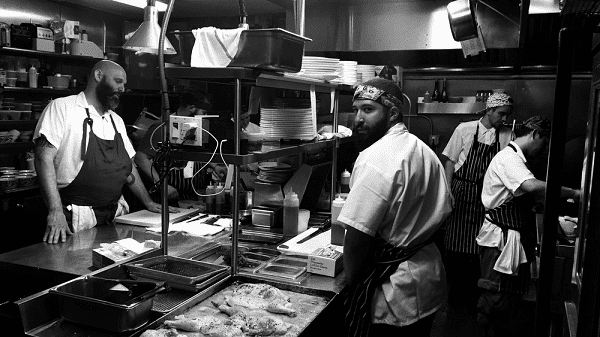Name of kitchen professionals- There are several professionals who work in the field of kitchens and food preparation. Some of them include:
- Chef: A chef is a highly trained culinary professional who is responsible for creating and preparing dishes in a kitchen. They may specialize in various types of cuisine, such as French, Italian, or sushi.
- Sous Chef: The sous chef is the second-in-command in the kitchen and assists the head chef in food preparation and kitchen management.
- Line Cook: Line cooks are responsible for preparing specific components of a dish and working on the cooking line to ensure that dishes are prepared and served quickly.
- Pastry Chef: Pastry chefs specialize in baking and creating desserts, pastries, and bread. They have a strong focus on the sweet side of the kitchen.
- Baker: Bakers are professionals who specialize in baking bread and other baked goods, such as cakes, cookies, and pastries.
- Kitchen Manager: Kitchen managers oversee the day-to-day operations of a kitchen, including staff management, inventory control, and ensuring that food safety and quality standards are met.
- Dishwasher: Dishwashers are responsible for cleaning and sanitizing dishes, utensils, and kitchen equipment, ensuring a clean and organized kitchen.
- Food Preparer: Food preparers assist in cutting, chopping, and preparing ingredients for the kitchen, helping with the mise en place.
- Food Expeditor: Food expeditors ensure that orders are prepared correctly, plated beautifully, and delivered to the right tables in a timely manner.
- Sommelier: A sommelier is a wine expert who helps customers choose wine to pair with their meals in a restaurant.
- Kitchen Designer: Kitchen designers specialize in planning and designing the layout and functionality of kitchen spaces, including the arrangement of appliances, cabinets, and countertops.
- Nutritionist/Dietitian: Nutritionists and dietitians may work in a kitchen setting to help plan and create healthier menu options and provide dietary advice.
- Food Safety Inspector: Food safety inspectors ensure that kitchens and restaurants adhere to health and safety regulations, including proper food handling, storage, and cleanliness.
- Food Scientist: Food scientists work on developing new food products and improving existing ones, often in a research and development kitchen.
- Food Photographer/Food Stylist: These professionals are responsible for making food look appealing for photography and media, ensuring that dishes are beautifully presented.
- Caterer: Caterers prepare and serve food for events, parties, and gatherings, often in a mobile kitchen setup.
These are just a few of the professionals who play various roles in the world of kitchens and food preparation. Depending on the size and type of establishment, there may be additional specialized positions or variations of these roles.
What is Name of kitchen professionals
Kitchen professionals are individuals who work in various roles within the culinary industry, helping to prepare, cook, and manage kitchen operations. Here are some common names for kitchen professionals:
- Chef
- Cook
- Sous Chef
- Line Cook
- Pastry Chef
- Baker
- Kitchen Manager
- Dishwasher
- Food Preparer
- Food Expeditor
- Sommelier
- Kitchen Designer
- Nutritionist/Dietitian
- Food Safety Inspector
- Food Scientist
- Food Photographer/Food Stylist
- Caterer
- Prep Cook
- Grill Cook
- Saucier (Sauce Chef)
- Butcher
- Garde Manger Chef (Cold Station Chef)
- Executive Chef
- Commis Chef
- Short Order Cook
- Private Chef
- Culinary Instructor
- Pantry Chef
- Sushi Chef
- Pastry Sous Chef
These are just some of the many kitchen professionals who work in the culinary field, each with their specific responsibilities and areas of expertise. The specific names and roles may vary depending on the type of kitchen, the cuisine, and the establishment’s size and structure.
Who is Required Name of kitchen professionals
The specific kitchen professionals required in a kitchen depend on the type of establishment, the size of the kitchen, and the menu being offered. However, there are several key kitchen professionals that are commonly needed in various types of kitchens:
- Chef: The head chef or executive chef is often the central figure in a kitchen, responsible for menu planning, overseeing the kitchen staff, and ensuring the quality of dishes.
- Sous Chef: The second-in-command, responsible for assisting the head chef and managing kitchen operations.
- Line Cooks: These chefs handle specific stations in the kitchen, such as the grill, sauté, or fryer, and are responsible for preparing dishes according to the menu.
- Pastry Chef: If the establishment serves desserts and pastries, a pastry chef is essential for creating these items.
- Baker: In kitchens that offer baked goods and bread, a baker is required to prepare these items.
- Kitchen Manager: Responsible for overseeing day-to-day kitchen operations, managing staff, and ensuring food quality and safety.
- Dishwasher: Responsible for cleaning and sanitizing dishes and kitchen equipment.
- Food Preparers: Assist in preparing ingredients, cutting, chopping, and organizing mise en place.
- Food Expeditor: Ensures orders are prepared correctly and delivered to the right tables promptly.
- Sommelier: In fine dining establishments, a sommelier helps customers select wine to complement their meals.
- Food Safety Inspector: Ensures that the kitchen adheres to health and safety regulations.
- Butcher: Responsible for cutting and preparing meat and poultry.
- Garde Manger Chef: Manages the cold station and is responsible for salads, appetizers, and cold dishes.
The specific professionals required will also depend on the cuisine and concept of the restaurant. For example, a sushi restaurant may require a sushi chef, while a pizzeria may need a pizza chef. A small café may not require as many specialized roles as a large, high-end restaurant. It’s important to assess the needs of the specific kitchen and menu to determine the required kitchen professionals.
When is Required Name of kitchen professionals

Kitchen professionals are required in various situations and settings where food is prepared, cooked, and served. Here are some common situations and contexts in which kitchen professionals are needed:
- Restaurants: Professional kitchens in restaurants typically require a range of kitchen staff, including chefs, line cooks, pastry chefs, and dishwashers.
- Catering Companies: Catering businesses need kitchen professionals to prepare and serve food for events, parties, weddings, and other gatherings.
- Hotels: Hotel kitchens employ kitchen staff to prepare meals for their restaurants, room service, banquets, and other dining options.
- Cafeterias: School cafeterias, hospital cafeterias, and workplace cafeterias all require kitchen professionals to prepare and serve meals to a large number of people.
- Food Trucks: Mobile food vendors need kitchen professionals to prepare and serve food from their trucks or carts.
- Cruise Ships: Cruise ship kitchens employ a wide range of kitchen professionals to serve passengers on board.
- Bakeries: Bakeries require bakers and pastry chefs to create bread, pastries, cakes, and other baked goods.
- Specialty Food Establishments: Specialty food shops, such as pizzerias, sushi bars, and ice cream parlors, require kitchen professionals with specific expertise.
- Fast Food Restaurants: Even fast food establishments need kitchen staff to prepare and assemble menu items.
- Fine Dining Restaurants: High-end restaurants often employ a larger and more specialized team of kitchen professionals, including executive chefs and sous chefs.
- Cooking Schools: Culinary schools and cooking classes employ chefs and instructors to teach cooking skills.
- Food Production Facilities: Food manufacturing facilities employ food scientists, production cooks, and other kitchen professionals to create and package food products.
In essence, kitchen professionals are required wherever food is prepared, cooked, and served to customers or clients. The specific roles and the number of professionals needed will vary depending on the type of establishment and the scope of their food service operations.
Where is Required Name of kitchen professionals
Kitchen professionals are required in various types of food service establishments and culinary environments. Here are some common places where kitchen professionals are needed:
- Restaurants: Restaurants of all types, from small bistros to fine dining establishments, require kitchen professionals to prepare and cook dishes for their customers.
- Hotels: Hotels with dining facilities, room service, and banquet services require kitchen staff to provide meals to guests.
- Catering Companies: Catering companies prepare and serve food for events such as weddings, corporate meetings, and private parties.
- Cafeterias: Schools, hospitals, office buildings, and other institutions with cafeterias need kitchen professionals to prepare and serve meals.
- Food Trucks: Mobile food vendors, including food trucks and food carts, require kitchen professionals to cook and serve food on the go.
- Bakeries: Bakeries and pastry shops employ bakers, pastry chefs, and kitchen staff to create bread, pastries, cakes, and other baked goods.
- Specialty Food Establishments: Businesses specializing in specific cuisines, such as pizzerias, sushi bars, and ice cream shops, need kitchen professionals with expertise in those areas.
- Fast Food Restaurants: Fast-food chains and quick-service restaurants employ kitchen staff to prepare and assemble menu items quickly.
- Fine Dining Restaurants: High-end or Michelin-starred restaurants often have larger and more specialized kitchen teams, including executive chefs, sous chefs, and pastry chefs.
- Food Manufacturing Plants: Food production facilities require kitchen professionals to oversee the mass production of various food products.
- Hospitals and Healthcare Facilities: Hospitals and healthcare institutions have kitchens that provide meals for patients and staff.
- Correctional Facilities: Prisons and detention centers have kitchens that employ kitchen professionals to prepare meals for inmates.
- Educational Institutions: Culinary schools and cooking programs require kitchen professionals to teach and demonstrate culinary skills to students.
- Food Research and Development Labs: Food companies and research institutions employ food scientists and chefs for product development and testing.
- Private Residences: Private chefs are often hired to prepare meals in the homes of individuals and families.
These are just a few examples of the places where kitchen professionals are required. The specific roles and the number of professionals needed can vary widely depending on the size and type of the establishment or culinary setting.
How is Required Name of kitchen professionals
The need for specific kitchen professionals is determined by the type of kitchen or food service establishment, its size, the menu it offers, and the level of service it provides. Here’s how the requirement for kitchen professionals is determined:
- Type of Establishment: The type of establishment, such as a restaurant, bakery, catering company, hotel, or food truck, dictates the roles and number of kitchen professionals needed.
- Menu and Cuisine: The menu’s complexity and cuisine influence the required expertise. For example, a French restaurant might need a trained pastry chef, while a pizzeria needs pizza makers.
- Size and Capacity: The size and capacity of the kitchen and the establishment determine staffing needs. A small café may need fewer professionals than a large hotel or fine-dining restaurant.
- Service Level: High-end or fine-dining restaurants often require more specialized professionals, including executive chefs and sommeliers, to provide a premium dining experience.
- Operational Hours: Establishments with longer hours of operation, such as 24/7 diners, may need multiple shifts of kitchen staff to cover all shifts.
- Event Volume: Catering companies and event venues need to staff up when catering larger events, parties, or weddings.
- Specialty Requirements: Some cuisines or preparation methods require specialized skills. For example, a sushi bar needs a sushi chef, and a bakery requires experienced bakers.
- Food Safety Regulations: Compliance with food safety regulations may require the presence of a food safety inspector or manager in the kitchen.
- Budget and Resources: Budget constraints can impact the number of professionals a kitchen can hire. Smaller establishments may have fewer resources to allocate to staffing.
- Customer Expectations: The expectations of customers and the desired quality of the dining experience influence the level of expertise required in the kitchen.
- Location: The location of the establishment can also influence staffing needs. High-cost-of-living areas may require higher wages for kitchen professionals.
- Seasonal Factors: Seasonal variations in business, such as tourist influx in certain areas, can affect staffing levels.
Ultimately, the decision on which kitchen professionals are required and how many will depend on the specific needs and goals of the establishment. It’s essential to carefully plan staffing based on the unique characteristics of the kitchen and the services it provides to ensure efficient and high-quality food production.
Case Study on Name of kitchen professionals
“Le Gourmet Elegance” Fine Dining Restaurant
Background: “Le Gourmet Elegance” is an upscale fine dining restaurant located in a major metropolitan city. The restaurant is known for its exquisite French cuisine and exceptional service. It has earned a Michelin star for its culinary excellence.
Key Kitchen Professionals:
- Executive Chef – Chef Pierre Dubois: Chef Pierre is the creative mastermind behind “Le Gourmet Elegance.” He is responsible for designing the seasonal menus, ensuring the highest quality ingredients, and overseeing all kitchen operations. Chef Pierre’s culinary expertise and creativity play a pivotal role in the restaurant’s success.
- Sous Chef – Chef Isabelle Laurent: Chef Isabelle is Chef Pierre’s right-hand person. She assists in menu planning, supervises the kitchen staff, and ensures that the restaurant’s high standards are maintained. Her role is crucial in maintaining consistency in the dishes.
- Pastry Chef – Chef Sophie Martin: As a talented pastry chef, Chef Sophie specializes in crafting the restaurant’s delectable desserts and pastries. Her creations are an essential part of the restaurant’s exceptional dining experience.
- Sommelier – Jacques Moreau: Jacques is a certified sommelier who curates an extensive wine list to complement Chef Pierre’s cuisine. He assists guests in selecting the perfect wine pairings, enhancing the overall dining experience.
- Line Cooks: A team of skilled line cooks, led by Chef Isabelle, is responsible for executing the dishes according to Chef Pierre’s recipes. Each cook specializes in a particular station, such as sauté, grill, and appetizers.
- Food Expeditor – Marie Dubois: Marie ensures that every dish leaving the kitchen is perfectly plated and adheres to the restaurant’s presentation standards. She coordinates with the front-of-house staff to ensure smooth service.
- Dishwasher – Jean-Claude Dupont: Jean-Claude plays a critical role in maintaining the restaurant’s cleanliness and efficiency. He ensures that dishes, utensils, and cookware are promptly cleaned and ready for use.
Case Highlights:
- Chef Pierre Dubois’s culinary artistry and vision set “Le Gourmet Elegance” apart. His expertise in French cuisine is the foundation of the restaurant’s reputation.
- The meticulous attention to detail and precise execution by the line cooks, overseen by Chef Isabelle, ensures the consistency and quality of each dish.
- The exquisite desserts and pastries crafted by Chef Sophie delight guests and contribute to the restaurant’s overall appeal.
- Jacques Moreau’s wine selections complement the dishes perfectly, enhancing the overall dining experience for guests.
- The smooth coordination and presentation of dishes by Marie Dubois add to the restaurant’s high-end ambiance.
- Jean-Claude Dupont’s behind-the-scenes role ensures that the kitchen operates efficiently by maintaining a clean and organized workspace.
Results: “Le Gourmet Elegance” continues to attract discerning diners and receive critical acclaim due to its commitment to culinary excellence and exceptional service. The collaborative efforts of the kitchen professionals result in a memorable and elegant dining experience that keeps guests returning for more.
This case study illustrates how various kitchen professionals in a fine dining restaurant work together to create a successful culinary establishment that exceeds customer expectations.
White paper on Name of kitchen professionals
The Role of Kitchen Professionals in the Culinary Industry
Abstract: This white paper explores the vital roles of kitchen professionals within the culinary industry. It highlights the diverse array of professionals working in various culinary settings, from restaurants to catering businesses, and how their collective expertise ensures the preparation and service of high-quality food. This paper also underscores the importance of each role in maintaining food safety, culinary creativity, and customer satisfaction.
Table of Contents
- Introduction
- Overview of the culinary industry
- The significance of kitchen professionals
- Key Kitchen Professionals
- Executive Chef
- Sous Chef
- Line Cooks
- Pastry Chef
- Baker
- Food Safety Inspector
- Dishwasher
- Sommelier
- Kitchen Manager
- Food Preparer
- Food Expeditor
- Other Specialized Roles
- Diverse Culinary Settings
- Restaurants
- Hotels
- Catering Companies
- Cafeterias
- Food Trucks
- Bakeries and Pastry Shops
- Fine Dining Establishments
- Fast Food Restaurants
- Food Manufacturing Plants
- Hospitals and Healthcare Facilities
- Correctional Facilities
- Educational Institutions
- Food Research and Development Labs
- The Kitchen Hierarchy
- Understanding the chain of command in professional kitchens
- The roles and responsibilities of each position
- The Culinary Arts and Expertise
- The creative process in the culinary industry
- The significance of a chef’s culinary vision
- The skills and knowledge required in various roles
- Food Safety and Regulation
- Ensuring food safety and quality
- The role of food safety inspectors
- Compliance with health and safety regulations
- Customer Experience and Satisfaction
- The direct and indirect impact of kitchen professionals on customer satisfaction
- Consistency, presentation, and service quality
- Challenges and Demands
- The demands and challenges faced by kitchen professionals
- Stress, long hours, and physical demands
- Future Trends in the Culinary Industry
- Evolving roles in modern kitchens
- The impact of technology on the culinary profession
- Sustainability and environmental considerations
- Conclusion
- Summarizing the essential roles of kitchen professionals
- Recognizing the dedication and skill required in the culinary industry
- References
- Citing sources and references used in the paper
Conclusion
This white paper provides an in-depth exploration of the roles and significance of kitchen professionals in the culinary industry. It emphasizes the diverse settings where these professionals are required, the importance of culinary creativity, food safety, and customer satisfaction. By recognizing the dedication and expertise of kitchen professionals, we gain a deeper appreciation for the artistry and skill that goes into preparing the food we enjoy in restaurants, cafeterias, and at special events.
This outline can serve as a starting point for a more comprehensive white paper on the roles and importance of kitchen professionals in the culinary industry. You can expand on each section with relevant information and research to create a thorough and informative document.





